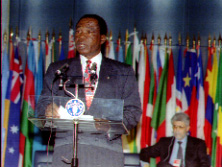


GHANA | ||
His Excellency Steve G. Obimpeh, Minister for Food and Agriculture of the Republic of Ghana | ||

I wish to congratulate the Director-General, Dr. Jacques Diouf, for making it possible for Heads of State and Government to assemble here to pledge their political and national commitment to the achievement of food security for their peoples. Mr. Chairman, allow me at this juncture to extend the warmest felicitations of my Head of State, His Excellency President Rawlings, and to express his deepest regret for his inability to be present at this most important Summit. Food security concerns have had a special place in his Government's developmental programme and "Food Security for All" has been his prime objective. This Summit has become necessary because over 800 million of the world's people are currently known to be living in a situation of food insecurity. This is in spite of the fact that it is technically feasible to attain food security for all, now and in the future. The most important constraints are inequitable distribution, unfair trade practices, low incomes and socio-cultural practices as well as unacceptably high population growth rates and ethnic conflicts in our part of the world. In our view therefore, the success of this Summit will be measured in terms of the pragmatic and implementable recommendations that will ensure both physical and financial access of all people to food both now and in the future. Whatever the outcome of the Summit, individual nations must take the initiative in reassessing their situation and policy options, and act appropriately to resolve their food security problems. At the domestic level, individual countries, especially developing countries, need to explicitly recognize the agricultural sector as the sector which holds the key to national development and poverty reduction. Within this context, agriculture must be pursued as a business rather than a farming undertaking best left to subsistence farmers, women, and those unable to find jobs in industry, commerce or the civil service. Therefore, our future agricultural schemes must be driven by the development and acquisition and adoption of effective demand-driven, consumer-focused, sustainable and appropriate agricultural technologies that can be readily adopted by small-scale farmers, especially women, to increase agricultural production, processing and marketing to enhance access to food. While rapid agricultural and economic growth is necessary for ensuring food security, growth alone cannot guarantee unrestricted access to food. It is therefore necessary for developing countries to put in place specific poverty-reduction strategies targeted at the poorest of the poor. It is the view of my Government that developing countries could benefit greatly from South-South cooperation and sharing experiences in developing programmes aimed at ensuring food security. My Government further believes that efforts by developing countries must be complemented by our development partners in a variety of ways, including the re-examination of the debt issue, access to regional and international markets, external resource flows and the agricultural policies of the developed countries. It is in this light that the Assembly of Heads of State and Government of the OAU, meeting at its Thirty-Second Session in Yaoundé, Cameroon, from 8 to 10 July 1996, passed a resolution expressing its strong support to FAO and calling upon the international community to accord special assistance to African countries to develop their food security and their agricultural sectors. Let me at this point register Ghana's gratitude to all those countries who have in recent times decided to cancel debts for certain developing countries - Ghana included - or convert them into grants, as well as to those countries that continue to offer significant grants in support of Ghana's economic recovery efforts. We are highly appreciative but will require more support if we are to come out of the poverty cycle and make significant progress towards the attainment of food security for all Ghanaians. As Ghana and other developing countries adopt market-oriented development and trading practices, the developed countries should complement this effort by carrying out the necessary adjustment that would reduce or eliminate both tariff and technical barriers to trade. It is also essential that they substantially reduce their agricultural support programmes to foster competition and fair trade practices. In this regard, we applaud the United States for enacting the Federal Agricultural Improvement Reform Act that provides for a seven-year phasing out of the United States Government's income support payments to farmers. My Government, in cooperation with rural farmers, non-governmental organizations, the private sector and research institutions, pledge our total support and commitment to the achievement of food security for all as a practical demonstration of our endorsement of the Rome Declaration and the World Food Summit Plan of Action. This commitment is expressed in the Ghanaian position paper for the World Food Summit that has given a thorough assessment of the food security situation in my country. My Government is committed to the full implementation of all the recommendations for future action, as indicated in my country's position paper, to ensure increased food security in Ghana as we enter the twenty-first century. | ||
|
|
|
|

 |